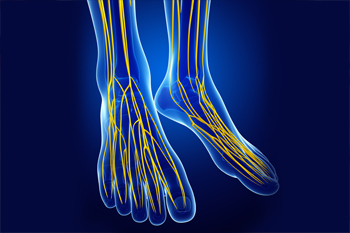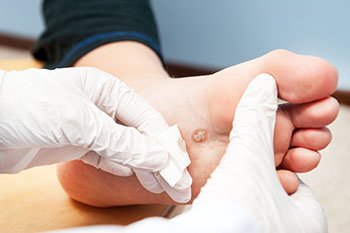Items filtered by date: February 2022
Why Live with Pain and Numbness in Your Feet?
Causes and Treatment for Plantar Warts
It is not uncommon for anyone who spends a lot of time at the gym or pool to develop plantar warts, or verrucae, on the bottom of the feet or around the toes. This condition is caused by the human papilloma virus (HPV) – a highly transmissible virus that loves moist, warm environments, such as locker rooms, shower floors, and swimming pool changing areas. The warts usually appear as a cauliflower-shaped growth with small dots. While they are basically harmless, they spread easily. Therefore, it’s a good idea to get rid of them as soon as possible. Because of this, patients who have a painful plantar wart, especially if it won’t go away on its own, would be wise to visit a podiatrist for treatment. Among the many options are removal with acid-based treatments, which are stronger than over-the-counter ointments, cryotherapy (freezing them off with liquid nitrogen), and laser surgery for larger clusters.
Plantar warts can be very uncomfortable. If you need your feet checked, contact one our our podiatrists from Newtown Comprehensive Foot Care. Our doctors will assist you with all of your foot and ankle needs.
About Plantar Warts
Plantar warts are the result of HPV, or human papillomavirus, getting into open wounds on the feet. They are mostly found on the heels or balls of the feet.
While plantar warts are generally harmless, those experiencing excessive pain or those suffering from diabetes or a compromised immune system require immediate medical care. Plantar warts are easily diagnosed, usually through scraping off a bit of rough skin or by getting a biopsy.
Symptoms
- Lesions on the bottom of your feet, usually rough and grainy
- Hard or thick callused spots
- Wart seeds, which are small clotted blood vessels that look like little black spots
- Pain, discomfort, or tenderness of your feet when walking or standing
Treatment
- Freezing
- Electric tool removal
- Laser Treatment
- Topical Creams (prescription only)
- Over-the-counter medications
To help prevent developing plantar warts, avoid walking barefoot over abrasive surfaces that can cause cuts or wounds for HPV to get into. Avoiding direct contact with other warts, as well as not picking or rubbing existing warts, can help prevent the further spread of plantar warts. However, if you think you have developed plantar warts, speak to your podiatrist. He or she can diagnose the warts on your feet and recommend the appropriate treatment options.
If you have any questions please feel free to contact our office located in Newtown, CT . We offer the newest diagnostic and treatment technologies for all your foot and ankle needs.
What Are the Treatments for Tarsal Tunnel Syndrome?
 Tarsal tunnel syndrome is a condition caused by compression of the posterior tibial nerve, which runs through a canal near the heel and into the sole of the foot. When the posterior tibial nerve is compressed, symptoms such as foot and ankle pain, burning, tingling, and numbness can arise. This condition is typically treated through conservative methods. These include resting and icing the affected foot, taking over-the-counter pain medications, wearing orthotics, immobilizing the foot, physical therapy, and steroid injections. In severe cases where conservative treatments have failed, decompression surgery may be needed. To learn more about tarsal tunnel syndrome, please seek the care of a podiatrist.
Tarsal tunnel syndrome is a condition caused by compression of the posterior tibial nerve, which runs through a canal near the heel and into the sole of the foot. When the posterior tibial nerve is compressed, symptoms such as foot and ankle pain, burning, tingling, and numbness can arise. This condition is typically treated through conservative methods. These include resting and icing the affected foot, taking over-the-counter pain medications, wearing orthotics, immobilizing the foot, physical therapy, and steroid injections. In severe cases where conservative treatments have failed, decompression surgery may be needed. To learn more about tarsal tunnel syndrome, please seek the care of a podiatrist.
Tarsal tunnel syndrome can be very uncomfortable to live with. If you are experiencing tarsal tunnel syndrome, contact one our our podiatrists of Newtown Comprehensive Foot Care. Our doctors can provide the care you need to keep you pain-free and on your feet.
Tarsal Tunnel Syndrome
Tarsal tunnel syndrome, which can also be called tibial nerve dysfunction, is an uncommon condition of misfiring peripheral nerves in the foot. The tibial nerve is the peripheral nerve in the leg responsible for sensation and movement of the foot and calf muscles. In tarsal tunnel syndrome, the tibial nerve is damaged, causing problems with movement and feeling in the foot of the affected leg.
Common Cause of Tarsal Tunnel Syndrome
- Involves pressure or an injury, direct pressure on the tibial nerve for an extended period of time, sometimes caused by other body structures close by or near the knee.
- Diseases that damage nerves, including diabetes, may cause tarsal tunnel syndrome.
- At times, tarsal tunnel syndrome can appear without an obvious cause in some cases.
The Effects of Tarsal Tunnel Syndrome
- Different sensations, an afflicted person may experience pain, tingling, burning or other unusual sensations in the foot of the affected leg.
- The foot muscles, toes and ankle become weaker, and curling your toes or flexing your foot can become difficult.
- If condition worsens, infections and ulcers may develop on the foot that is experiencing the syndrome.
A physical exam of the leg can help identify the presence of tarsal tunnel syndrome. Medical tests, such as a nerve biopsy, are also used to diagnose the condition. Patients may receive physical therapy and prescriptive medication. In extreme cases, some may require surgery.
If you have any questions please feel free to contact our office located in Newtown, CT . We offer the newest diagnostic and treatment technologies for all your foot and ankle needs.
Complications With Diabetes and the Feet
 Diabetes is a systemic condition that can affect many parts of your body – including the feet. Due to the chronically raised blood sugar levels associated with diabetes, the nerves and blood vessels that supply the lower limbs can become damaged. This can cause neuropathy and poor circulation, both of which can lead to strange sensations, such as burning and tingling or numbness in the feet, a loss of sensation, and the formation of poorly healing foot wounds. The skin and nails on the feet may also change. Skin can become dry and cracked, and start to peel, and calluses may form more quickly, as well. Because diabetes can also cause immune insufficiency, foot and nail infections are more likely to occur. If you have diabetes, it is suggested that you visit a podiatrist regularly to monitor and preserve the health of your feet.
Diabetes is a systemic condition that can affect many parts of your body – including the feet. Due to the chronically raised blood sugar levels associated with diabetes, the nerves and blood vessels that supply the lower limbs can become damaged. This can cause neuropathy and poor circulation, both of which can lead to strange sensations, such as burning and tingling or numbness in the feet, a loss of sensation, and the formation of poorly healing foot wounds. The skin and nails on the feet may also change. Skin can become dry and cracked, and start to peel, and calluses may form more quickly, as well. Because diabetes can also cause immune insufficiency, foot and nail infections are more likely to occur. If you have diabetes, it is suggested that you visit a podiatrist regularly to monitor and preserve the health of your feet.
Diabetic foot care is important in preventing foot ailments such as ulcers. If you are suffering from diabetes or have any other concerns about your feet, contact one our our podiatrists from Newtown Comprehensive Foot Care. Our doctors can provide the care you need to keep you pain-free and on your feet.
Diabetic Foot Care
Diabetes affects millions of people every year. The condition can damage blood vessels in many parts of the body, especially the feet. Because of this, taking care of your feet is essential if you have diabetes, and having a podiatrist help monitor your foot health is highly recommended.
The Importance of Caring for Your Feet
- Routinely inspect your feet for bruises or sores.
- Wear socks that fit your feet comfortably.
- Wear comfortable shoes that provide adequate support.
Patients with diabetes should have their doctor monitor their blood levels, as blood sugar levels play such a huge role in diabetic care. Monitoring these levels on a regular basis is highly advised.
It is always best to inform your healthcare professional of any concerns you may have regarding your feet, especially for diabetic patients. Early treatment and routine foot examinations are keys to maintaining proper health, especially because severe complications can arise if proper treatment is not applied.
If you have any questions please feel free to contact our office located in Newtown, CT . We offer the newest diagnostic and treatment technologies for all your foot and ankle needs.
Metatarsalgia 101
 The term metatarsalgia refers to any condition that causes pain in the ball of the foot, also known as the metatarsal region. The most common cause of metatarsalgia is pain from inflammation in the metatarsal heads (ball of the foot) that puts pressure on the front of the foot. There are a variety of other causes that can lead to pain in this area of the foot including bunions, overuse of the ball of the foot, aging, having higher arches, arthritis, gout, or diabetes. Other factors, such as being overweight or wearing high heels, can also lead to stress in this area. If you are dealing with discomfort or pain in the ball of your foot, it may be a good idea to consult with a podiatrist for a proper diagnosis and to discuss various treatment options.
The term metatarsalgia refers to any condition that causes pain in the ball of the foot, also known as the metatarsal region. The most common cause of metatarsalgia is pain from inflammation in the metatarsal heads (ball of the foot) that puts pressure on the front of the foot. There are a variety of other causes that can lead to pain in this area of the foot including bunions, overuse of the ball of the foot, aging, having higher arches, arthritis, gout, or diabetes. Other factors, such as being overweight or wearing high heels, can also lead to stress in this area. If you are dealing with discomfort or pain in the ball of your foot, it may be a good idea to consult with a podiatrist for a proper diagnosis and to discuss various treatment options.
Foot Pain
Foot pain can be extremely painful and debilitating. If you have a foot pain, consult with one our our podiatrists from Newtown Comprehensive Foot Care. Our doctors will assess your condition and provide you with quality foot and ankle treatment.
Causes
Foot pain is a very broad condition that could be caused by one or more ailments. The most common include:
- Bunions
- Hammertoes
- Plantar Fasciitis
- Bone Spurs
- Corns
- Tarsal Tunnel Syndrome
- Ingrown Toenails
- Arthritis (such as Gout, Rheumatoid, and Osteoarthritis)
- Flat Feet
- Injury (from stress fractures, broken toe, foot, ankle, Achilles tendon ruptures, and sprains)
- And more
Diagnosis
To figure out the cause of foot pain, podiatrists utilize several different methods. This can range from simple visual inspections and sensation tests to X-rays and MRI scans. Prior medical history, family medical history, and any recent physical traumatic events will all be taken into consideration for a proper diagnosis.
Treatment
Treatment depends upon the cause of the foot pain. Whether it is resting, staying off the foot, or having surgery; podiatrists have a number of treatment options available for foot pain.
If you have any questions, please feel free to contact our office located in Newtown, CT . We offer the newest diagnostic and treatment technologies for all your foot care needs.


